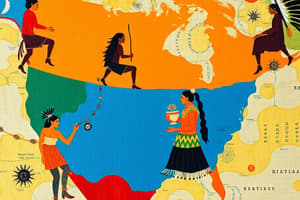Podcast
Questions and Answers
What term was historically used by early explorers from Europe to refer to the indigenous people of the land?
What term was historically used by early explorers from Europe to refer to the indigenous people of the land?
Indians
Which term is considered offensive if used by non-Indigenous persons to refer to Indigenous people?
Which term is considered offensive if used by non-Indigenous persons to refer to Indigenous people?
Indian
What is the official designation of Indigenous people used by the Government of Canada?
What is the official designation of Indigenous people used by the Government of Canada?
Aboriginal
Which term specifically refers to Indigenous peoples that are not Inuit or Metis?
Which term specifically refers to Indigenous peoples that are not Inuit or Metis?
What term is used to refer to the peoples of the far north and is considered derogatory today?
What term is used to refer to the peoples of the far north and is considered derogatory today?
What term refers to the combination of French and Indigenous peoples resulting in a unique culture?
What term refers to the combination of French and Indigenous peoples resulting in a unique culture?
What term was historically used to identify indigenous persons, issues, and culture, but is not in widespread use at present time?
What term was historically used to identify indigenous persons, issues, and culture, but is not in widespread use at present time?
Which term specifically refers to the peoples of the far north and is considered derogatory today?
Which term specifically refers to the peoples of the far north and is considered derogatory today?
What term is the result of the combination of French and Indigenous peoples, resulting in a unique culture?
What term is the result of the combination of French and Indigenous peoples, resulting in a unique culture?
Which term refers to something unique to and arising from a particular area, encompassing all First Nations, Inuit, and Metis peoples?
Which term refers to something unique to and arising from a particular area, encompassing all First Nations, Inuit, and Metis peoples?
What term is an official designation of Indigenous people used by the Government of Canada?
What term is an official designation of Indigenous people used by the Government of Canada?
Which term specifically refers to Indigenous peoples that are not Inuit or Metis?
Which term specifically refers to Indigenous peoples that are not Inuit or Metis?
What term is used by the Government of Canada as part of an official acknowledgement of indigeneity?
What term is used by the Government of Canada as part of an official acknowledgement of indigeneity?
Flashcards are hidden until you start studying
Study Notes
Historical Terms and Context
- Early European explorers referred to indigenous people as "savages," reflecting a colonial mindset.
- "Native" is considered offensive if used by non-Indigenous persons to refer to Indigenous peoples, as it can be seen as derogatory.
Official Designations
- The Government of Canada uses the term "Indigenous peoples" as the official designation.
- "First Nations" specifically refers to Indigenous peoples that are neither Inuit nor Métis.
Terminology and Cultural Context
- "Eskimo" was historically used to refer to the peoples of the far north but is now considered derogatory.
- "Métis" refers to the unique culture resulting from the combination of French and Indigenous peoples.
Current Usage Trends
- "Aboriginal" was a term previously used to identify Indigenous persons, issues, and culture, but has fallen out of widespread use.
- "Inuit" refers to the specific Indigenous peoples of the far north, which is also considered derogatory when used inaccurately.
Geographic and Cultural Identity
- "Indigenous" encompasses all First Nations, Inuit, and Métis peoples and signifies unique identities tied to specific areas.
- The term "Indigenous" is used by the Government of Canada in official acknowledgments of indigeneity, reflecting their recognition of diverse First Nations.
Studying That Suits You
Use AI to generate personalized quizzes and flashcards to suit your learning preferences.




